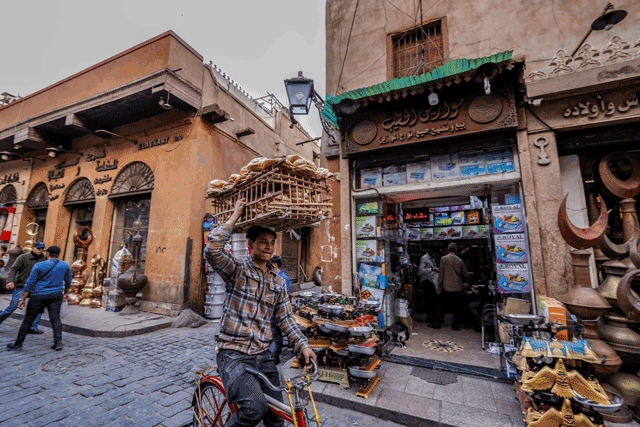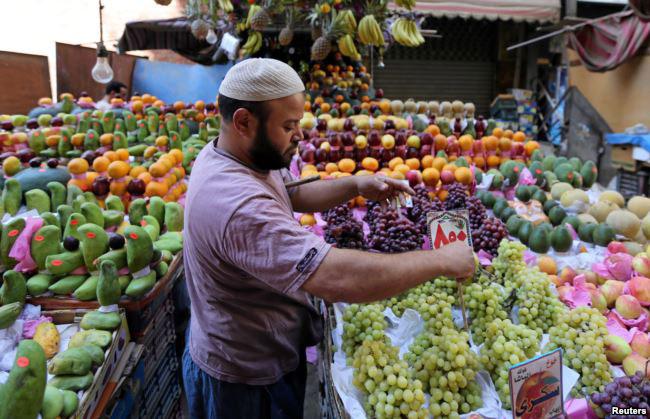You are here
Egypt inflation hits record high of nearly 40%
By AFP - Sep 10,2023 - Last updated at Sep 10,2023

In this photo taken on February 27, a deliveryman balances a load of bread on his head as he rides a bicycle through a street in the old quarters of Cairo (AFP photo)
CAIRO — Annual inflation in Egypt hit 39.7 per cent in August, official figures showed Sunday, an all-time high as the Arab world's most populous country grapples with a punishing economic crisis.
It comes after a previous record of 38.2 per cent in July and amid an unrelenting downturn that has seen the currency shed half its value against the US dollar since early last year.
Food and drink prices alone rose 71.9 per cent year-on-year, said the state statistics agency CAPMAS.
The economic crisis in the import-dependent country was catalysed by Russia's invasion of Ukraine last year, which destabilised crucial food supplies and unsettled global markets.
Investors pulled billions out of Cairo's foreign reserves, which remain buoyed by deposits from wealthy Gulf allies, whose promises to purchase Egyptian state assets have however fallen short of government targets.
Even before the current crisis, 30 per cent of Egyptians were living below the poverty line, according to the World Bank, with another 30 per cent considered vulnerable to also falling into poverty.
Egypt, with more than 105 million people, has been dependent on bailouts in recent years, from both oil-rich Gulf allies and the International Monetary Fund (IMF).
According to ministry of planning figures, the country's external debt bill has tripled over the past decade, rising to a record high of $165.4 billion this year.
Researcher Robert Springborg of the Italian Institute of International Affairs has blamed Egypt's economic model, in which the military plays a key role, arguing it is based on "profligate borrowing for prestige projects with limited economic benefits".
The crowning jewel of the government's projects is the $58 billion New Administrative Capital that experts have called "a vanity project".
Delayed IMF programme
Last year, the IMF approved a $3 billion loan for Egypt conditioned on "a permanent shift to a flexible exchange rate regime".
The smaller-than-expected loan was intended to unlock other sources of funding, namely from regional allies.
But Egypt has failed to raise its target funding, and the IMF has not issued its first review of the programme or the second tranche of the loan. Both were originally expected in March.
The IMF and Gulf capitals have demanded a fully flexible exchange rate, economic reforms and an end to the notoriously obscure business dealings of the military.
But despite repeated rumours of a fresh devaluation, authorities have kept the pound pegged at around 31 EGP to the dollar since January.
Consumer prices have continued to steadily rise, adding to the burden of families who are struggling to make ends meet.
Severe foreign currency shortages have also heavily impacted the economy, limiting imports and causing a parallel currency market to surge up to 25 per cent higher than bank rates.
Remittances from Egyptians abroad, the country's biggest source of foreign revenue, have been falling since the crisis began, as people turn to the parallel market to send money home.
Between July 2022 and March 2023, the central bank reported a 26.1 per cent fall in remittances — one of several "volatile, vulnerable" sources of foreign currency Egypt relies on, according to Springborg.
Cairo's foreign reserves have slowly inched upwards since the crisis began, reaching $34.9 billion in August, according to the central bank — still $7 billion less than before the Ukraine war.
Around $29 billion of those are deposits from wealthy Gulf allies, according to the central bank.
Related Articles
CAIRO — Annual inflation in Egypt hit 36.8 per cent in June, official figures showed on Monday, an all-time high for the country grappling w
CAIRO — The Egyptian pound was trading on Wednesday at half its value from March after the central bank intervened for a third time as part
CAIRO — Egypt's agricultural exporters are seeing a surge in demand and finding new foreign markets only months after the currency was float













